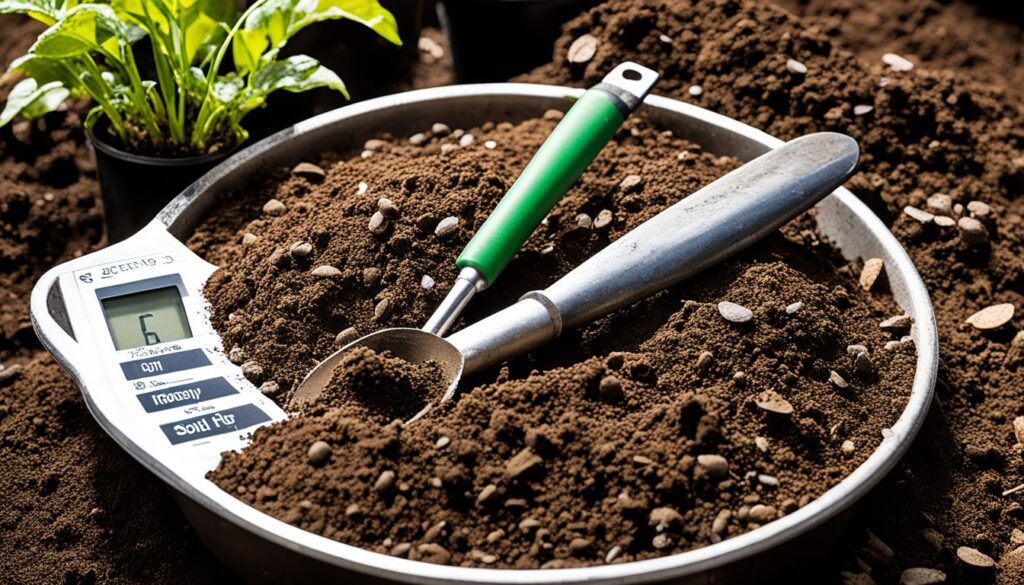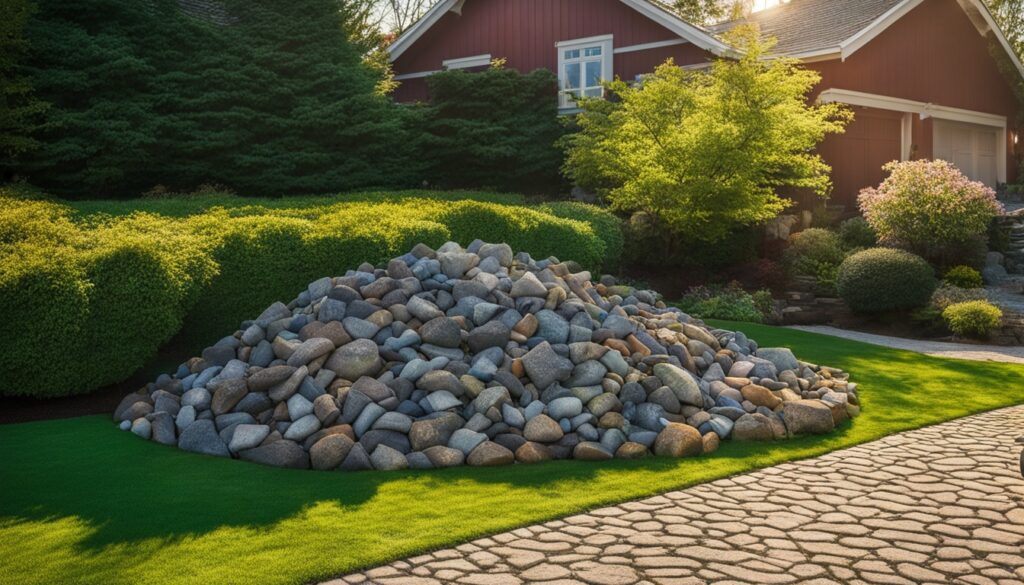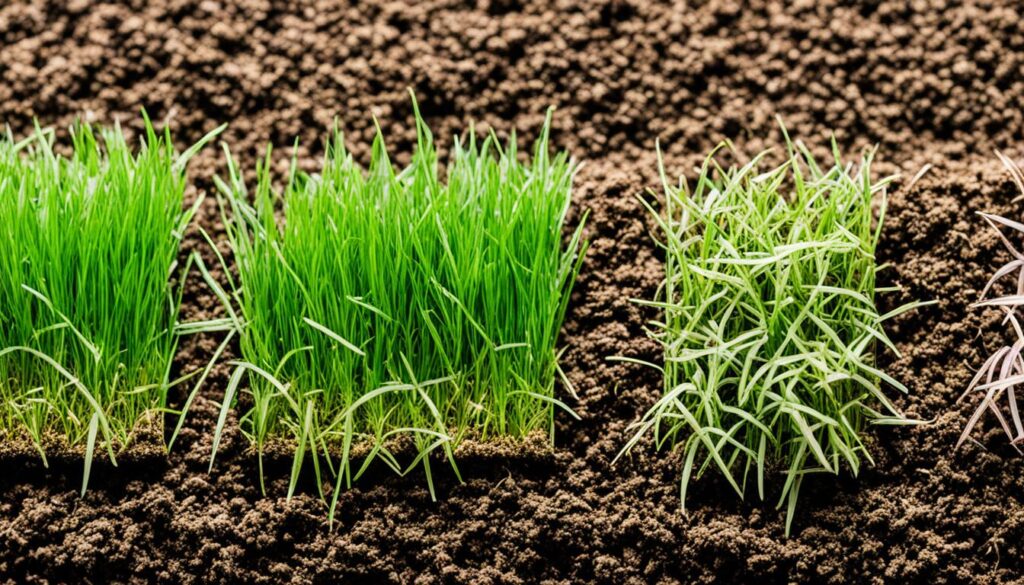Did you know a dry cubic yard of topsoil can hit up to 2,000 pounds? When it’s wet, it can go up to 3,000 pounds. Topsoil is key for plants to grow well and for gardens to flourish. It’s full of minerals and life from tiny creatures.
Knowing how deep and heavy your topsoil is is vital for planning gardens or lawns. Things like how wet it is, what it’s made of, and how packed it is affect its weight a lot.
Key Takeaways
- A dry cubic yard of topsoil can weigh up to 2,000 pounds, while a wet cubic yard can weigh up to 3,000 pounds.
- Factors like moisture content, soil type, and compaction can significantly impact the weight of garden soil.
- Lawns thrive well in 4 to 6 inches of topsoil, while vegetable crops require more.
- A dump truck can carry between 10 and 14 cubic yards of topsoil at a time.
- Wet topsoil may weigh up to twice as much as dry topsoil due to the presence of water.
Introduction to Garden Soil
What is Garden Soil?
Garden soil, or topsoil, is a mix of garden soil composition, minerals, air, water, and tiny living things. It’s made up of sand, silt, clay, and things like compost or peat. This soil gives plants the nutrients they need to grow, bloom, and produce fruit.
It also keeps moisture in but lets water drain, which is good for plants. The weight and volume of garden soil change based on what’s in it and how wet it is. On average, it weighs 40 to 75 pounds per 2 cubic feet.
“An ideal soil for plant growth contains 50% pore space and 50% solids, with the pore space filled with equal parts air and water.”
Soil experts say the best soil mix is 50% air pockets, 45% minerals, and 5% organic stuff. The mix of sand, silt, and clay tells us about the soil’s textural class. This mix is hard to change, even with human help.
Having good soil is key for a great garden. It lets roots grow well, get water and nutrients, and stay healthy. For a 3×6 raised bed with 10″ sides, you need 15 cubic feet of soil. This mix should have 60% topsoil, 30% compost, and 10% potting mix.
Importance of Soil Weight in Gardening
Understanding the weight of garden soil is key to successful gardening and landscaping. Soil weight affects its nutrient density, water retention, and how well it supports plants. Knowing about soil weight helps gardeners make choices that help their plants grow strong and healthy.
Soils that are heavier, like clay, have more nutrients. These nutrients are vital for healthy plant growth and soil fertility. On the other hand, lighter soils, such as sandy soils, might not have enough nutrients. They might need extra help to get the nutrients plants need.
Soil weight also affects how well it holds onto water. Heavy soils, with their dense nature, keep moisture better. This is great for plants in dry or drought-prone areas, where saving water is important for survival and growth.
Soil weight helps keep plants stable, preventing them from being easily pulled out. Heavy soils give plants a strong base. This helps them stand up to strong winds or heavy rain.
Knowing how soil weight affects nutrient levels, water retention, and plant stability helps gardeners make better choices. This knowledge lets them create the best conditions for their plants. This leads to a garden that is full of life and produces well.
| Soil Type | Weight per Cubic Foot (lbs) |
|---|---|
| Sandy Soil | 90-110 |
| Clay Soil | 110-130 |
| Loamy Soil | 100-120 |
The weight of garden soil changes a lot due to moisture, compaction, and type. It’s important for gardeners to understand these differences. This knowledge helps them make smart choices and keep their plants healthy and stable over time.
Factors Affecting Garden Soil Weight
The weight of garden soil depends on moisture and type. Knowing these factors is key for your gardening projects.
Moisture Content
Wet soil is heavier than dry soil because of water molecules. Soil moisture can make up to 50% of its total weight. Wet soil is 20-30% heavier than dry soil.
Soil Type
Soil types vary in density and weight. Clay soil is very dense and heavy, weighing about 100-120 pounds per cubic foot. Sandy soil is much lighter, at 90-110 pounds per cubic foot.
Loamy soil, a mix of sand, silt, and clay, is in between, weighing around 100-120 pounds per cubic foot.
Finding the exact weight of garden soil is hard because of soil sample variations. But knowing how moisture and soil type affect its weight helps with gardening planning.
“Soil unit weight is influenced by factors such as mineralogy of the soil particles, particle size distribution, angularity of particles, moisture content, and organic content.”
How Much Does Garden Soil Weigh?
Understanding the weight of your garden soil is key for gardening. The average soil weighs between 74-110 pounds per cubic foot. This depends on things like moisture and organic matter. This wide range affects your gardening projects a lot.
The weight of garden soil can change a lot, even in a small area. For example, 2 cubic feet of soil can weigh from 40 to 75 pounds. This depends on its makeup. Factors like:
- Moisture content: Wet soil is much heavier than dry soil.
- Soil type: Soils with more clay are denser and heavier than sandy or loamy ones.
- Organic matter: Soils with more compost are usually lighter.
Knowing what affects soil weight is key for gardening plans. It helps you pick the right tools and resources for the job.
| Soil Characteristic | Weight Range (per cubic foot) |
|---|---|
| Dry Garden Soil | 74-90 lbs |
| Wet Garden Soil | 90-110 lbs |
| Soil with High Organic Matter | 60-80 lbs |
| Soil with High Clay Content | 100-120 lbs |
Knowing the average garden soil weight and the soil weight range helps you plan better. You can pick the right tools and resources for your gardening. This makes planting smoother and more successful.
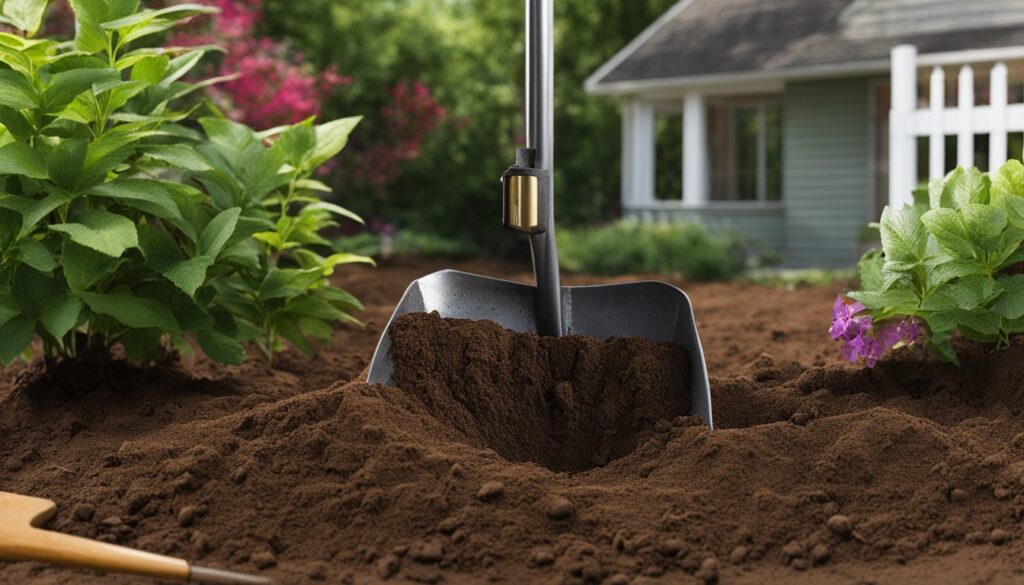
“Knowing the weight of your garden soil is crucial for planning and executing successful gardening projects. It helps ensure you have the right tools and resources to handle the soil effectively.”
Calculating Garden Soil Weight
Understanding the weight of garden soil is key for gardening projects. You can start by using the average weight per cubic foot. This helps you figure out how much soil you need.
Using Average Weight per Cubic Foot
A typical cubic foot of garden soil weighs between 74 and 110 pounds. This depends on things like moisture content. Multiply the average weight by the volume you need for your project to estimate the total weight.
For instance, if you want 2 cubic feet of soil and each weighs about 90 pounds, the total is 180 pounds. But, the actual weight can change due to the soil’s makeup and moisture.
| Soil Volume | Weight at 74 lbs/ft³ | Weight at 90 lbs/ft³ | Weight at 110 lbs/ft³ |
|---|---|---|---|
| 1 cubic foot | 74 lbs | 90 lbs | 110 lbs |
| 2 cubic feet | 148 lbs | 180 lbs | 220 lbs |
| 3 cubic feet | 222 lbs | 270 lbs | 330 lbs |
This method helps you estimate the soil you need for your gardening. Keep in mind, the actual weight can change based on the moisture content impact and your area’s cubic foot weight.
Soil Density and Compaction
Soil compaction can make garden soil heavier. When soil particles are packed tightly, the soil’s weight goes up. A study by ScienceDirect found that compacted soil can be up to 20% heavier than loose soil. Moisture, organic matter, and soil type also affect soil density and weight.
Impact of Soil Compaction
Knowing how soil compaction affects weight is key for gardeners. It changes the soil’s final weight and can affect your gardening success. Compacted soils have a bulk density of 1.23 to 1.67 g/cm³, with sandy soils being the densest.
Severely compacted soils can hurt root growth, especially in clay and wet soils. They also block water and air movement and harm soil life. These problems can last for decades and are hard to fix.
| Soil Texture | Ideal Bulk Density for Plant Growth (g/cm³) |
|---|---|
| Sands, Loamy Sands | |
| Silty Soils | |
| Clayey Soils |
To fight soil compaction, tillage and adding compost can help. They can lower the soil’s bulk density by 0.25 to 0.35 g/cm³. But fixing compaction’s long-term effects is hard. So, understanding and managing soil density and compaction is key for gardening plans.
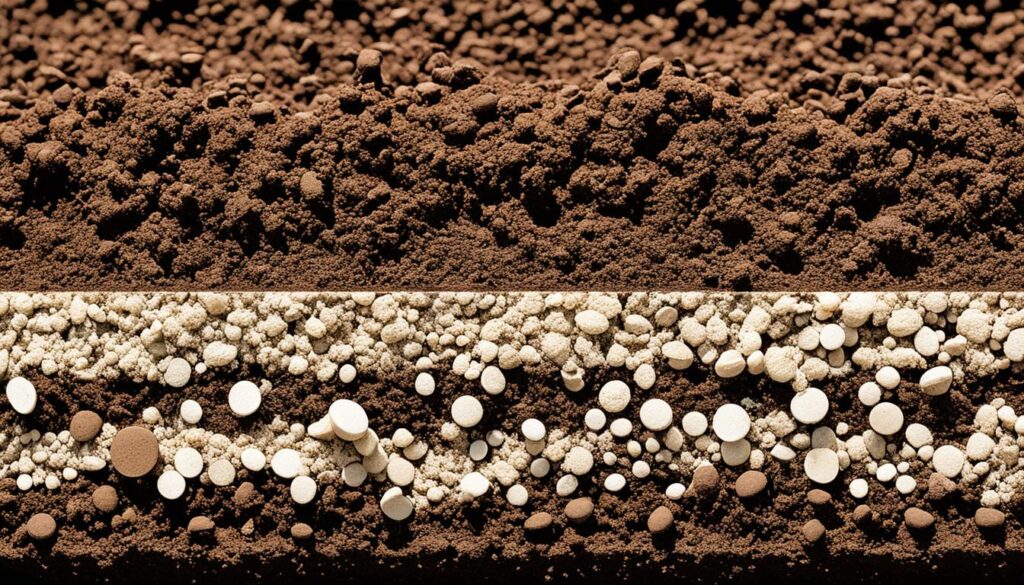
“Compacted soils are created by activities like increased traffic, lack of soil cover, and use of fill.”
how much does garden soil weigh
The weight of garden soil can vary a lot, from 40 to 75 pounds for 2 cubic feet. This depends on things like moisture, soil type, and how compacted it is. Moisture content, soil type, and compaction all play a role. Wet soil is heavier because of the water in it. Different soils like clay, sand, and loam also have different densities.
Compacting the soil can make it up to 20% heavier. Knowing about these soil weight factors helps when you’re planning your garden.
A dry cubic yard of topsoil can weigh up to 2,000 pounds. But a wet cubic yard can be as heavy as 3,000 pounds. The type and quality of the soil also affect its weight. For example, unscreened topsoil costs between $10-$25 per cubic yard. Organic mixes can be more expensive, from $30-$50 per cubic yard.
| Soil Type | Weight Range (per cubic yard) | Cost Range (per cubic yard) |
|---|---|---|
| Unscreened Topsoil | 1,950 – 2,250 lbs | $10 – $25 |
| Organic Compost | 2,200 – 2,800 lbs | $20 – $40 |
| Screened Topsoil | 2,100 – 2,400 lbs | $20 – $40 |
| Landscape Mix | 2,150 – 2,550 lbs | $25 – $40 |
| Organic Mix | 2,300 – 2,750 lbs | $30 – $50 |
| Black Dirt | 2,050 – 2,350 lbs | $15 – $25 |
| Super Loam | 2,100 – 2,550 lbs | $17 – $50 |
Knowing about the garden soil weight and what affects it is key for gardening success. It helps with figuring out how much soil you need and how to move it safely. With this knowledge, you can make better choices and grow beautiful gardens with the right soil.
Conclusion
The weight of garden soil is key when planning gardens and landscapes. It varies from 40 to 75 pounds for 2 cubic feet. This depends on moisture, soil type, and how compacted it is.
Soil with more moisture, dense clay, or being compacted makes it heavier. By knowing about garden soil weight, gardeners can pick the right soil, manage water, and support plants. This leads to successful gardening.
Knowing about garden soil weight helps gardeners plan for the right tools, transport, and work needed. It makes gardening easier and more efficient. It also helps pick the best soil mix and additives for plants to grow well, making gardens healthy and full of life.
FAQ
What is garden soil and what is it made of?
Garden soil, also known as topsoil, is the top layer of earth crucial for plants to grow well. It’s made of minerals from rocks, wood, and organic stuff, plus tiny life forms. This soil mix includes sand, silt, clay, and things like compost or peat.
Why is the weight of garden soil important?
The weight of garden soil matters a lot for gardening and landscaping. Heavy soils often have more nutrients, which plants need. Soil’s weight also affects how well it holds water, which is key for plants. Plus, it keeps plants stable, so they don’t get pulled out easily.
What factors affect the weight of garden soil?
Many things can change how heavy garden soil is. Moisture levels and soil type are big factors. Wet soil is heavier because of water molecules. Soil types like clay, sand, and loam also vary in density and weight.
Clay is very dense and heavy, while sandy soil is lighter. Loamy soil, a mix of sand, silt, and clay, is in between in terms of weight.
How much does 2 cubic feet of garden soil typically weigh?
Usually, 2 cubic feet of garden soil weighs between 40 to 75 pounds. This depends on how wet it is and what’s in it, like organic stuff.
How can soil compaction affect the weight of garden soil?
Soil compaction makes garden soil heavier. When soil is packed tightly, it gets more dense. ScienceDirect says compacted soil can be up to 20% heavier than loose soil.
Moisture, organic matter, and soil type also play a part in its density and weight.

